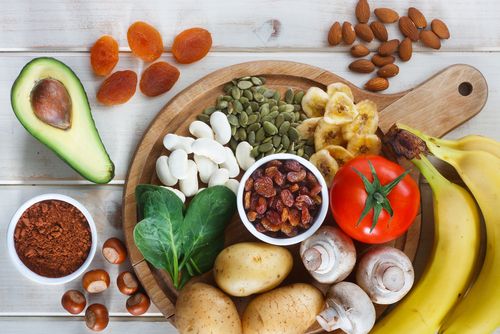5 Micronutrients Every Woman Should Pay Attention To

You’ve likely heard the word “macros,” a slang term for the three macronutrients—carbs, protein, and fat. You may even carefully plan your daily macros. “I need x grams of carbs before a run and x grams of protein after a run.” While macros are definitely important, many people spend so much time focusing on macros that they tend to forget about micros, aka micronutrients. Nutrients like choline, Vitamin D, sodium, calcium and potassium are vital to your running performance, so let’s show them a little love.
Choline
If you’re thinking, What the heck is choline? you’re not alone. According to recent research, 90 percent of Americans don’t get the recommended 550 milligrams (mg) per day and 65 percent of people have never even heard of choline. One of its major functions is sending signals from the brain to working muscles, making choline a vital nutrient for muscle function in runners. It may not come as a shock that choline is under consumed, since it’s most prevalent in foods like liver and lima beans. But a well-balanced diet rich in lean meats, whole eggs, and green vegetables can help people get enough of this micronutrient. If your diet is lacking leafy greens or eggs, consider choline supplements or look for foods fortified with choline.
Vitamin D
Luckily, this micronutrient gets a ton of attention. But, even though it’s in the limelight, many people are still Vitamin D deficient. Vitamin D aids in calcium absorption and helps with maintaining bone strength, both of which are particularly important for women. Adequate Vitamin D intake is also associated with preventing diseases, like cancer, heart disease and high blood pressure. You may know Vitamin D as the “sunshine vitamin,” but many people who live in colder climates or have darker skin tones don’t absorb enough of this essential vitamin. A diet rich in Vitamin D sources, like eggs or mushrooms, should provide enough of this micronutrient. But if you’re worried, talk to your doctor about getting tested for Vitamin D deficiency.
Sodium
Although too much sodium has been linked to high blood pressure and heart disease, most runners know that sodium is part of a healthy fueling routine. Sodium is the main electrolyte lost in sweat, and many runners lose an average of one gram of sodium per liter of sweat. The cells rely on sodium to maintain fluid balance, which is why hydration is not just about fluid intake, but also about sodium intake. However, this doesn’t give you license to eat an entire bag of potato chips before each run. With the standard American diet, most people can get the recommended 2,300 mg of sodium per day. If you’re headed out for a hot and humid run, think about incorporating a sports drink that contains sodium or add a pinch of salt to your water.
Calcium
Every woman, regardless of age, should think about their calcium intake on a daily basis. Inside the body, calcium is most commonly found in bones and in the blood.
If you don’t eat enough calcium, the blood draws calcium out from the bones, weakens them in the process. If this happens repeatedly, the bone loss can be irreparable and may cause osteoporosis or stress fractures. According to the American College of Sports Medicine (ACSM), stress fractures account for 0.7 to 15.6 percent of all athletic injuries. The best way to prevent calcium deficiencies is to eat at least 1,000 mg per day from good calcium sources, like dairy, green vegetables, such as kale, broccoli, bok choy, and spinach, and soy products.
Potassium
Potassium is most known for two things—lowering blood pressure and maintaining fluid balance. Although runners generally have good heart health, those with a family history of heart disease should be very mindful of their potassium intake. Eating the recommended 3,500 milligrams per day can help keep your blood pressure in the healthy range. Potassium is also an important electrolyte that is lost in sweat. Failing to replace potassium after a sweaty run can exacerbate the symptoms of dehydration. Potassium is in many foods, and it shouldn’t be difficult to obtain the recommended amount. Bananas, sweet potatoes, pomegranate juice, beets, tomatoes, oranges, avocados and brussels sprouts are all rich in potassium.
Related:
7 Most Critical Nutrients For Female Athletes